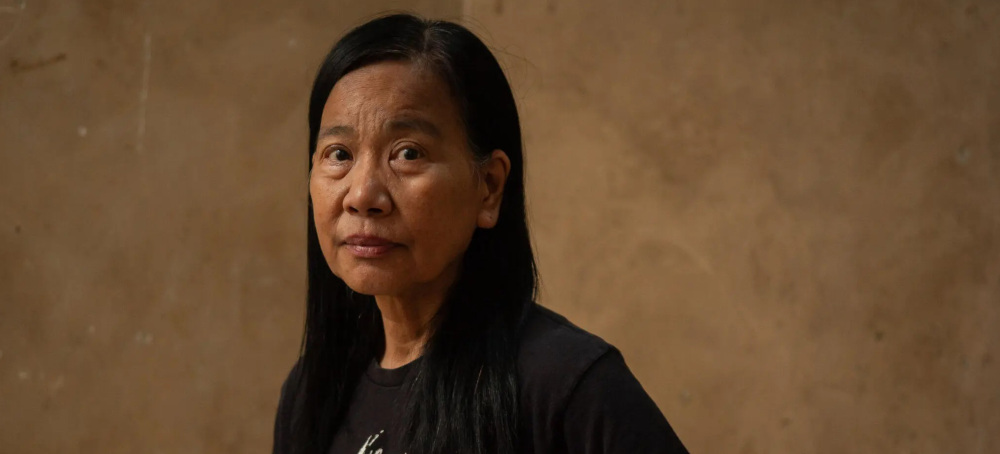Meet One of Hong Kong’s Last Remaining Pro-Democracy Activists
Tiffany May The New York Times Chan Po-ying posed for photographs in Hong Kong on Friday. (photo: Billy H.C. Kyok/The New York Times)
Chan Po-ying posed for photographs in Hong Kong on Friday. (photo: Billy H.C. Kyok/The New York Times) Meet One of Hong Kong’s Last Remaining Pro-Democracy Activists
Tiffany May The New York Times
For Chan Po-ying, a labor rights leader, life is one of constant police surveillance, even on hikes. But she finds solace from tiny gestures of support.
But a handful still remain.
One of them is Chan Po-ying, the 68-year-old leader of the League of Social Democrats, a political party focused on labor and social welfare.
Hong Kong’s opposition was once a small but formidable presence. Lawmakers organized filibusters to block bills they saw as limiting freedoms. Street marches were common. Then, after anti-government protests engulfed Hong Kong in 2019, China imposed a sweeping crackdown on the city.
Ms. Chan took over as the party’s chairwoman in 2021 after the arrest of several members and leaders, including her husband, Leung Kwok-hung, a former lawmaker better known as Long Hair. Mr. Leung was among those sentenced last week.
The New York Times spoke with Ms. Chan to hear how she navigates the increasingly narrow — not to mention risky — confines of politics in today’s Hong Kong. This interview has been edited and condensed.
How did you become an activist?
I came of age during the Vietnam War protests, civil rights movement and the women’s suffrage movement, and they were big influences on me as I was growing up.
In my 20s, I worked in a garment factory for four years, partly to earn a living and partly in the hopes of understanding firsthand the situation of female workers. Many had to give up their education and marry for economic or family reasons. It felt very unjust.
I went to university at 30 to study social work and started doing advocacy on behalf of working-class women, as well as victims of domestic violence or sexual assault.
What is political life in Hong Kong like for you now?
There’s not much I can do now. Some organizations that weren’t even that political were forced to disband.
It used to be common for us to forge alliances with other small groups to amplify our voices. Now, we keep our distance and are cautious around one another.
Also, when we asked volunteers to help with our street booths, they were accused of soliciting donations and displaying posters without a permit. They pleaded guilty and had to pay a fine.
Once, when we went hiking with friends, the police detained us at the start of the trail for more than two hours and took down our ID numbers. Every step we take is restricted.
How do you and your group avoid arrest?
We are no longer delivering petitions to the government on politically sensitive dates like we used to. We have been contacted [by the authorities] “suggesting” that we stop doing this.
This year, ahead of the passage of Article 23 [a local security law], three of us were surrounded by around 50 police officers when we tried to submit a petition.
The first year and a half after the national security law was passed was a nerve-racking time. Something happened every week.
But I believe their tactics are now less heavy-handed, to avoid it turning into international news. Instead, they will try to dry up your money and come at you with laws and regulations you haven’t even considered. The charges are petty, but you will be fined.
It feels like we’re being repressed in a very underhanded way.
What can’t you do now?
Last year, HSBC terminated our bank accounts. Since then, we have been unable to accept donations online. We have had to reduce our expenses to a minimum. We stopped renting an office, and let go of all paid staff.
At the street booths that we set up, we no longer ask people to sign petitions or write cards to political prisoners.
There is a lot of psychological pressure because the police arrive at the street booths before we do, and film the entire process. If we ask people for their signatures, they will be filmed, too. We don’t want to cause harm to anyone.
People used to think that signing a petition or coming out for a march could put pressure on the government. Now many know that there is no use.
What motivates you to keep going?
When you are under pressure for a long time, you have to find ways to cope. I try to face it calmly. I always say that we can’t change our circumstances. We can only change ourselves and how we handle our feelings.
Over the past few years, things I used to find unjust and infuriating I now simply find ludicrous and absurd. It all feels like a farce.
Do you feel that what you’re doing is meaningful?
Of course it is. If it weren’t, I wouldn’t do it.
And I’m not the only one. Carrying on is a way to support and encourage each other. At least we feel less lonely.
For example, when I’m at a street booth, I see people walking over from far away to get a pamphlet. You don’t know how far small gestures can go.
